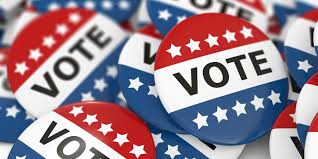In a presidential election year, democracy hits overdrive.
Candidates and campaigns blitz to every state. Every issue is vital, every vote matters, every citizen is important, every ….
Oops, we meant to say every vote matters – IF it’s from one of the swing states. All citizens matters – IF they’re among the ones (less than 18 per cent of the nation) who live there.
“There are only about seven states that are going to make a difference in this election,” Polly Baca – featured in a PBS documentary at 10 p.m. Monday (Sept. 30) – told the Television Critics Association.
She lives in Colorado, which isn’t one of them. She can blame the Electoral College – which she’s part of. “I’ve been an elector for five presidential elections, but I oppose the Electoral College. It’s totally undemocratic.”
Derrick Willburn, another Coloradoan, disagrees with her on that … and other things. She’s a Democratic elector, he’s a Republican elector – and a fan of the system. He calls it “America’s original anti-bullying program.”
That was the notion when the Constitution was created. Each state, big or small, gets two senators; in the presidential race, each state gets one vote for each person in the Senate or House. That led to wild disparities:
— In the Senate. Wyoming, with 584,000 people, has the same number of senators as California – which has more than 60 times as many people. Indeed, you could combine 21 states (that’s 42 senators) and you’d still have fewer people than California (2 senators).
— In the electoral college, because senators are part of the formula. Wyoming has about 195,000 people per electoral vote; California has 720,000.
The PBS film sticks to the latter issue, viewing the plan’s roots.
“The Electoral College is a direct product of the attempt to empower slave states,” Jelani Cobb, a journalism-school dean, told the TCA.
Southern states – with fewer citizens – insisted on an Electoral College formula that partially counted slaves. “It was about counting three-fifths of an enslaved population (for) more political power,” said Maximinia Juson, the film’s producer, director, writer and (for Jan. 6 footage) cameraperson.
That was eventually removed, but lately a new electoral crisis has appeared.
Until recently, most states were in play. In 1964, the Democrat (Lyndon Johnson) won 44 of them; in ‘72, the Republican (Richard Nixon) won 49.
Since then, however, views have calcified on both sides. This year, strategists feel that only seven states could go either way – Arizona, Georgia, Michigan, Nevada, North Carolina, Pennsylvania and Wisconsin. Their people — just over one-sixth of the U.S. population –get all the attention.
In the other states, Juson said, it’s still important to vote – partly because of the lower races and partly to send a message. “Candidates look at data.”
But for the great mass – five-sixths of all voters – it’s harder to be motivated, she said. “Voter turn-out in states that are not swing states” is lower.
Not long ago, every state seemed to count. In 1960, Nixon spent valuable time flying to Alaska, already a lock for Republicans; he had pledged to campaign in all 50 states.
Nowadays, “all seven states” sounds more practical. “The only place where every single vote does not count is in the presidential race,” Bacca said.
Monday’s special – “One Person, One Vote?” under the “Independent Lens” banner – happens to be one of two PBS films that view gaps in the Constitution. “The American Vice President” – which some stations will air before Tuesday’s vice presidential debate — views the succession rules.
In that case, there was a change: The 1963 Kennedy assassination left the U.S. with a president (Lyndon Johnson) who had no vice president and had barely survived a heart attack, eight years earlier.
The 25th amendment was passed in ‘67 and was soon needed, when Spiro Agnew and Richard Nixon left in ‘73 and ‘74.
No such solution is expected this time. “The political work that it would require to get rid of the Electoral College is daunting,” Cobb said.
So he can merely imagine a time when every vote counts the same …even the ones in non-swing states.

Every vote counts? It depends on where you are
In a presidential election year, democracy hits overdrive.
Candidates and campaigns blitz to every state. Every issue is vital, every vote matters, every citizen is important, every ….
Oops, we meant to say every vote matters – IF it’s from one of the swing states. All citizens matters – IF they’re among the ones (less than 18 per cent of the nation) who live there.
“There are only about seven states that are going to make a difference in this election,” Polly Baca – featured in a PBS documentary at 10 p.m. Monday (Sept. 30) – told the Television Critics Association. Read more…